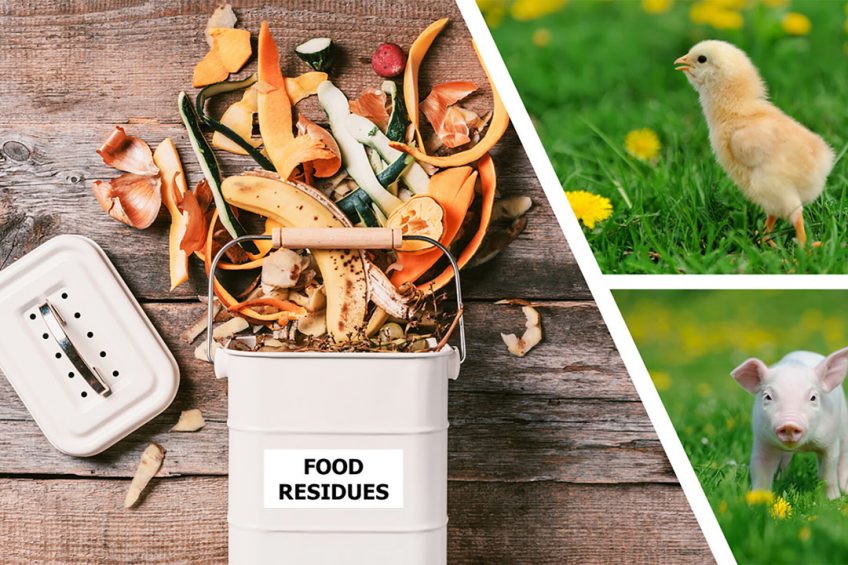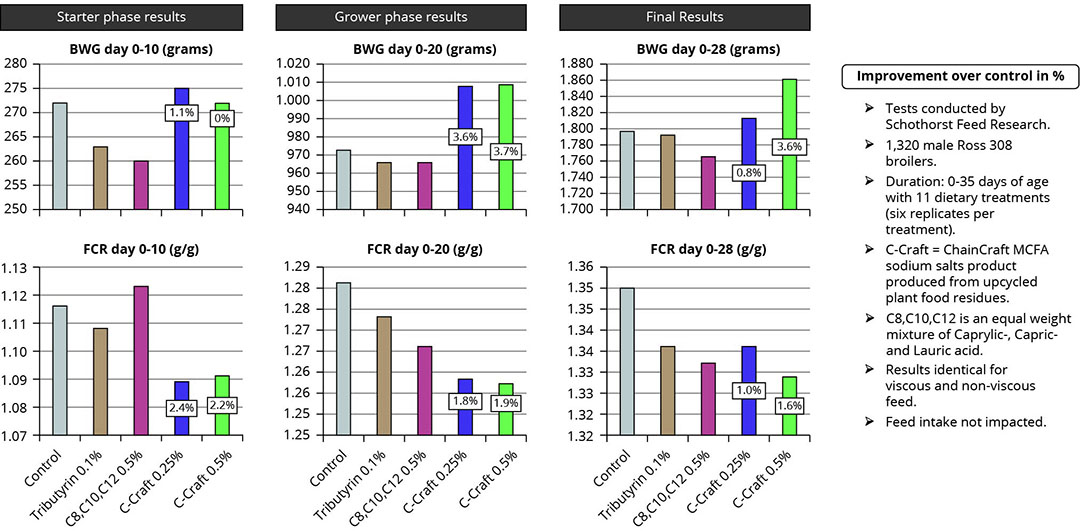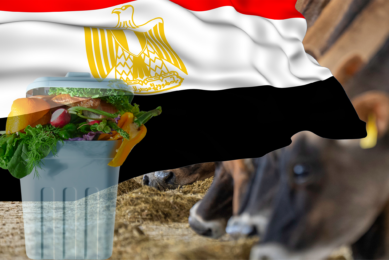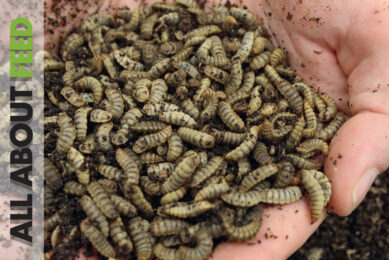Vital early life support with unique, sustainable fatty acids

The need for higher farm yields in combination with an increasing awareness on sustainability are driving innovation in agriculture. In response, ChainCraft is converting plant food residues into the next generation fatty acid products that can boost health and productivity of young monogastrics.
Demand for animal proteins will grow by 45% towards 2035. There is therefore an urgent need for innovations to further boost feed efficiency and health of farm animals if we want to continue to feed the world with the land and resources that we have available for agriculture. This great endeavour requires creativity and innovation from producers all across the value chain as well as skills, expertise and an innovative mindset from farmers. ChainCraft has responded to this challenge by developing state-of-the-art fermentation technology for converting plant-based food residues into next generation fatty acids products (C-Craft range). While standard MCFA additives are based on non-sustainable feedstocks (palm oils, petroleum) and mainly combat gram-positive bacteria, this new generation MCFA product containing both Butyrate (C4) and Caproate (C6) moves far beyond that.
Are you the innovative farmer who will outperform the standard, by using a sustainable additive for letting your chicks and piglets thrive?
C4 and C6 combined
Butyrate (C4) is one of the most widely used and well-known additives within current livestock farming. The resulting improvement of tight junction formation, villus/cryptus ratio, gene expression and anti-inflammatory effects have boosted efficiency at numerous farms for many years. Caproate (C6) usage in agriculture is however still relatively uncommon because of traditional high pricing and limited availability (a mere 0.3% in palm kernel- and coconut oil).
However, it is an excellent antimicrobial and gut health support and can provide a great boost to the productivity of all types of livestock. Caproate has proven to be exceptionally effective against Salmonellae, E. coli, and various other pathogens, in particular gram-negative bacteria. In addition, the medium chain fatty acids (C6-C12) have proven to be effective as antiviral agents as well, by causing leakage or total disintegration of the viral envelope.
Essential support to young livestock
During their early life, animals experience various periods of unavoidable increased stress, for instance dietary changes of piglets during weaning and chicks around hatching and adaptation to farm conditions. These physiological stress situations have a massive impact on the animal’s digestive system and result in increased vulnerability to pathogens. Health support with feed additives applied via the feed or drinking water right from the start are considered a successful strategy to boost animal welfare and to reduce economic losses. For gut health, any form of Butyrate (C4) will provide a valuable support. For antimicrobial strength it depends on the type of pathogens encountered during these early phases of life, which are predominantly gram-negative bacteria, such as E. coli and Salmonellae. These are most effectively combatted by Caproate (C6). Development of gut health and microbiome of these young chicks and piglets will benefit the welfare and productivity of these animals both directly and throughout the rest of their lifetime.
Figure 1 – Improved body weight gain and feed conversion ratio using C-Craft.

Proven formula for boosting productivity
The proprietary ChainCraft mixture of short- and medium chain fatty acid sodium salts (C-Craft) has been tested in young broiler feed at Schothorst Feed Research and demonstrated great performance improvement. Although the animals were kept under optimal conditions, and not challenged, the C-Craft product still provided additional body weight gain (BWG) of 3.7% and a 2.4% feed conversion ratio (FCR) improvement compared to the control feed (Figure 1).
Functionality of the C-Craft additive originates from the gut health effects of Butyrate, the strong anti-microbial effects of Caproate plus other fatty acids present in low quantities (acetate, propionate, valerate, heptanoate, caprylate) and synergies between these fatty acids. This synergism is thought to result from the fact that MCFA (>C5) damage the bacterial cell walls, after which shorter fatty acids (<C5) can penetrate and disrupt the inner cell.
Fermented food residues
Current short- and medium chain fatty acid products are derived from either petroleum, palm kernel or coconut oil. Besides the extreme volatility in pricing and availability, none of these oil feedstocks is sustainable.
Those fatty acids derived from petroleum oil require high energy consumption and carbon emissions for production of petroleum and the subsequent processing into fatty acids.
The fatty acids derived from palm kernel or coconut oil require high carbon emissions for production and their use corresponds to deforestation of valuable rainforest areas. In turn, various feed processors have already declared that they voluntarily refrain from using such product in animal feeds.
The short- and medium chain fatty acids salt product (C-Craft) produced by ChainCraft via fermentation of food residues has a 70% lower carbon footprint and decreases energy use for production by 50% compared to these current processes. Moreover, the product helps to reduce the major environmental burdens of waste land-filling and burning and supports a vision of fully circular agriculture. The ChainCraft upcycling process is based on a proprietary fermentation technology developed at Wageningen University in the Netherlands.
When is a good time to switch to innovative new solutions with economical and sustainability benefits? The current high prices and scarce availability of many of the incumbent antimicrobial feed additives (standard organic acids) confirms that now is the time to make the transition to circular fatty acid supplies.
References are available on request







